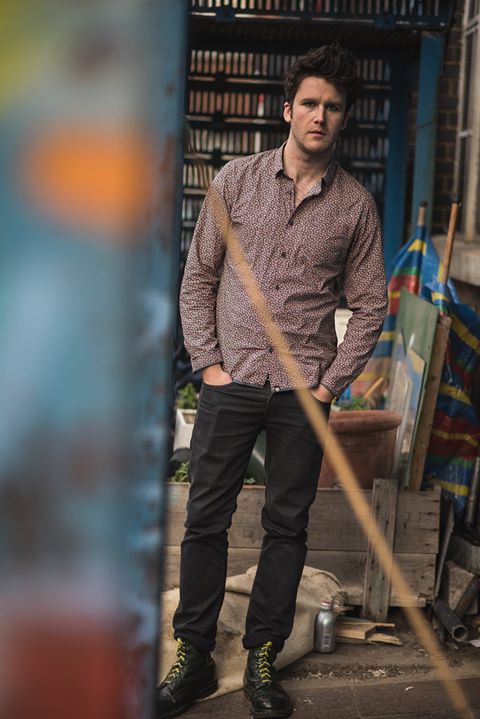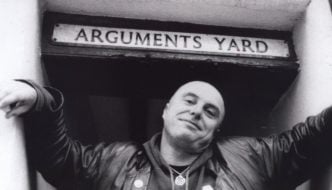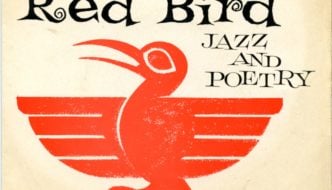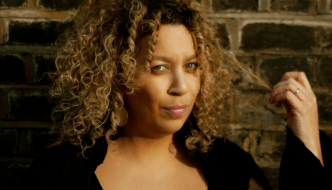
This month’s Write. North. interviewee is Matt Abbott, owner of spoken word label Nymphs and Thugs (formed in 2015) and organiser of LIVEWire travelling spoken word events. Hailing from Wakefield and travelling frequently between Leeds and his current home in East London, I met Matt at the Hyde Park Book Club where he was hosting a spoken word event. I asked him how he regarded the north as a concept and as a region. He talks about the danger of typecasting, of both northerners and the north. It makes you think – are we reflecting what’s there or shaping it? What comes first, the cart or the horse?
“There’s a noticeable difference between north and south but is this down to class as much as anything else? Is that where part of the discussion lies?” he asks. And how do we quantify class in this age of social mobility? Again, referencing his living in London and visits back up north for work, Abbott says that, as a working-class writer, having some distance from Wakefield helps him to write more sharply about it, and things that come from it. I ask him how he feels about the concept of ‘giving voice’ to regions or characters? It’s sometimes positioned as an act of post-colonial power wielding. Who are we to ‘give’ voice? He decries professional northerners: “Voice is already there” he says, “it already exists; it’s about uncovering it and using hard cash and good venues to promote it. Not romanticising it.”
Writing about social and political issues in an accessible, direct and often humorous way, Abbott describes himself as a writer, artist and performer. Still on the subject of voice, I ask him where he finds voices for his spoken word nights, which he puts on around the U.K. “My aim is to put LIVEWire on bi-monthly, as well as promoting ‘Chelping’.” (a long standing, vibrant Yorkshire spoken word night, held in Leeds Library). “I travel all over the shop”, says Abbott. “I’ll compere nights in London and the south east too. I want to stage poetry electric enough to engage an audience, and accessible enough for a first-timer to not feel they don’t know what you’re on about. Diversity in audience means diversity on stage. I want the audience to feel a connection. I’m anti the view of poetry as elitist academic snobbery but I also don’t subscribe to the all too easy aphorism that all you need is a pen and a piece of paper. Having Arts Council Funding means I can use spoken word events to provide an entry point to poetry and performance. It strikes me as being very democratic and I Iike that.”
Abbott goes onto say “We’re perhaps seeing less of a contrast now between venues and audiences in north and south but there’s still no denying there are more venues, and more money being pumped into the bigger towns and cities. London has a reputation for quality; every night is a Saturday night. Wakefield has the wonderful Arthouse, also the Hepworth and Yorkshire Sculpture Park, but these are areas that traditionally have lower artistic engagement.” It’s the horse and cart thing again. If it’s not there, you can’t access it. That’s why putting on a programme of national entertainment UK-wide is important to Abbott. “For a spoken word performance, the question of audience is particularly alive and immediate. Arts Council Funding allows the production of spoken word nights in the north that have the same financial support and advantages as those in the more affluent south. It means people can be paid fairly, and afford to travel to some areas that they wouldn’t generally reach.”
This allows Abbott to bring a wide range of really strong, varied poets to venues across the country. Nymphs and Thugs spoken word artists have included Joelle Taylor, Sabrina Mahfouz, Theresa Lola, Cecilia Knapp, Toby Campion, Toria Garbutt, Salena Godden, Nafeesa Hamid, Kevin P. Gilday, Luke Wright and Victoria McNulty, and it is rapidly developing a reputation as one of the most electric nights on the scene. The night I was there (with students from the Creative Writing degree course at Leeds Arts University) we heard, amongst others, Wigan-based poet Loise Fazackerley. Acting as compere, occasional performer and all-round team player, Abbott’s pop up infrastructure brought the chilly basement venue alive. Fazackerley delivered an electric performance. Her poems work on the page with their linguistic tricks and textual quirks but out loud they explode. She has a blog – Guardian Northerner. Check her out. This is from ‘A word in your shell like, babe’:
Pay day loans stack as stilts
She’s a maybe MILF, silt showgirl, free guilt
Clown-face, the spangly costume nearly fits.
This isn’t just about the north, true, but it is from the north. I was at the Brudenell on Saturday night hearing Pete Wylie of the Mighty Wah sing ‘Heart as Big as Liverpool’ to a generally entranced, if pretty rowdy crowd. When he finished he said “This isn’t just about Liverpool, you know. This is about any northern industrial town or city”. And that made me think. There’s a history to the north that contains all the dead industries, all the closed pits, all the shutdown cotton mills, the swing from producer to service provider. It happened everywhere, I know that, de-industrialisation. But what happened post-industrialisation is important and makes us consider the particular circumstances and histories that make this place what it is.
“Would you write north with a capital N?”, I ask Abbott.
“Good question. Yes.”
Filed under: Written & Spoken Word
Tagged with: accessible, arts council, audience, democratic, funding, Matt Abbott, North, Nymphs and Thugs, performance, poetry



Comments